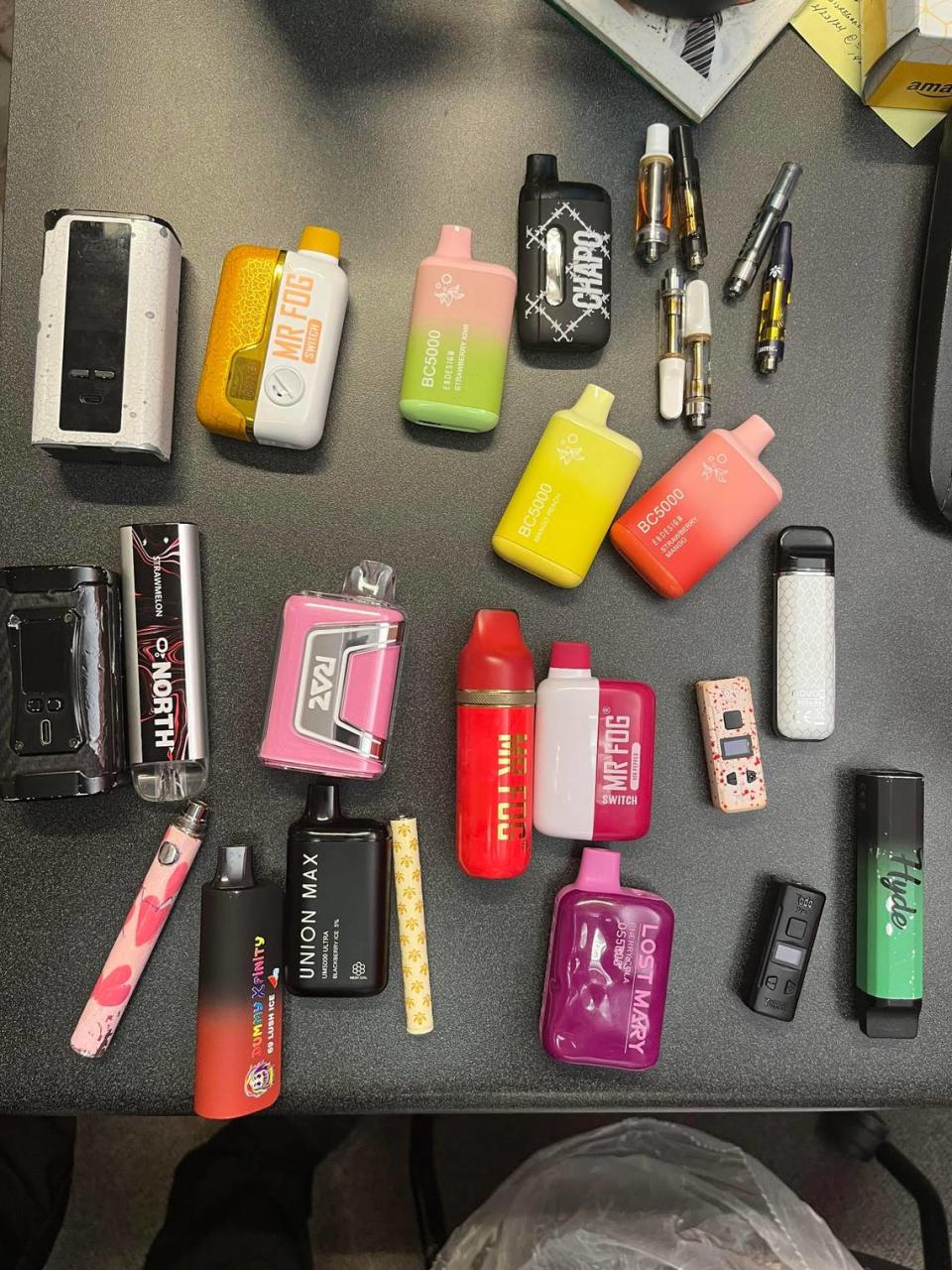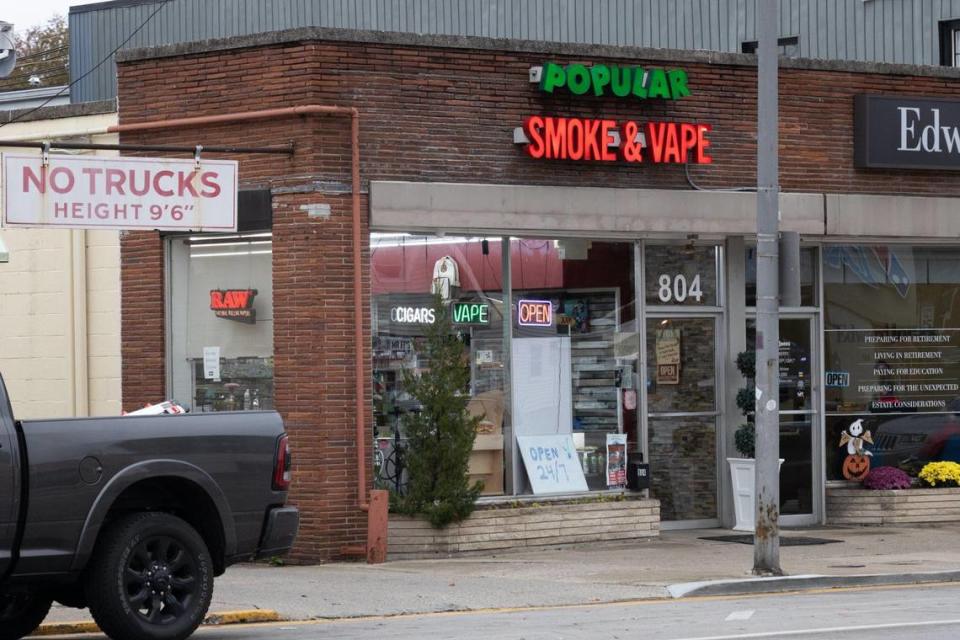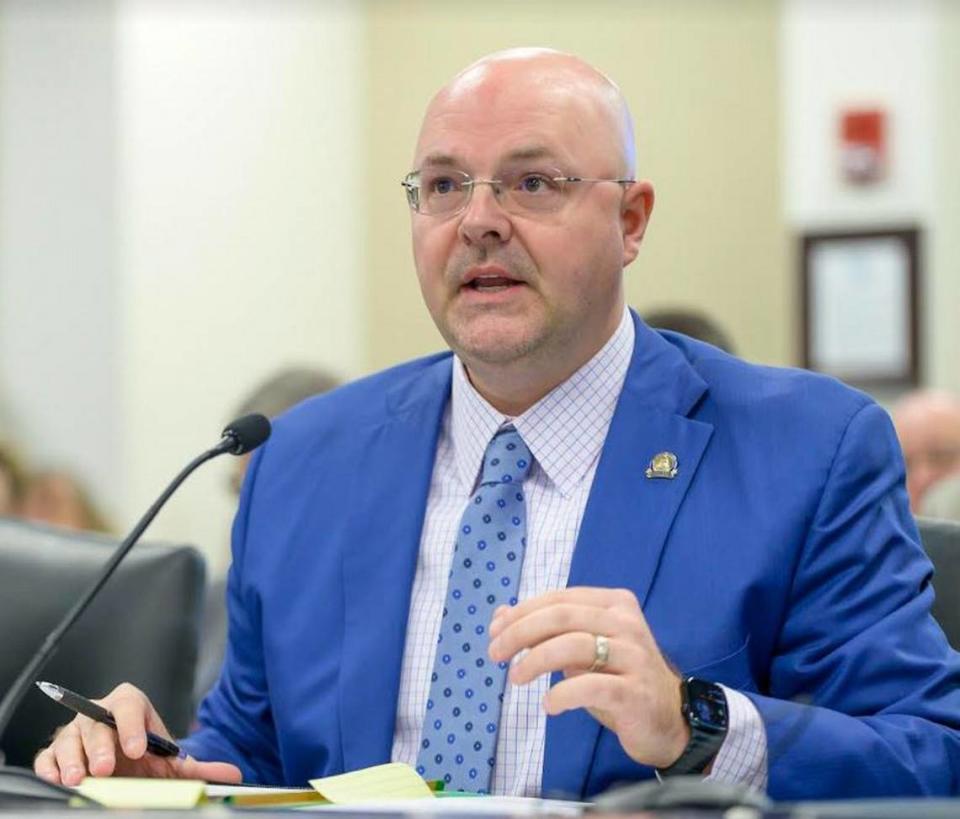KY lawmakers take aim at stores that illegally sell vapes and cigarettes to kids
Kentucky lawmakers are moving bills this legislative session to crack down on businesses illegally selling vape and tobacco products to youths.
The minimum legal age to buy smoking products is 21. But the Herald-Leader reported in December that over a recent 21-month period, state regulators cited at least 114 Kentucky retailers two or more times for selling smoking products to minors, usually issuing only small fines or warning letters.
And the problem is likely worse than that.
Unlike most states, Kentucky does not require tobacco and vape retailers to be licensed, so there is no list on file in Frankfort. Many newer stores in particular are unknown to regulators who are supposed to catch illegal sales to minors by sending in undercover, under-aged agents.
It’s easy for kids to get their hands on vape and tobacco products in this environment, as evidenced by the large number of vapes confiscated in elementary, middle and high schools around the state, witnesses have testified to legislative committees.

More than one in every four high school seniors said they vaped in the past year, despite the harmful effects of nicotine on their developing brains and the substances inhaled into their lungs from the vape aerosol, according to a 2021 statewide health survey by the Kentucky Cabinet for Health and Family Services.
“Word gets around where you can buy these products illegally and it spreads like a domino effect,” Mallory Jones, a junior at George Rogers Clark High School in Winchester, told the House Health Services Committee on Thursday.
As unhealthy as smoking tobacco is, children are immediately sickened from vaping dangerous substances in flavors that are marketed directly to them, including cotton candy and strawberry, Commonwealth’s Attorney Jackie Steele of London told the Senate Licensing and Occupations Committee last week.
“We’re taking kids out of the schools in ambulances and on gurneys because they’re catatonic and they don’t even know what they smoked and what they took,” Steele said.
Sign up for our Bluegrass Politics Newsletter
A must-read newsletter for political junkies across the Bluegrass State with reporting and analysis from the Lexington Herald-Leader. Never miss a story! Sign up for our Bluegrass Politics newsletter to connect with our reporting team and get behind-the-scenes insights, plus previews of the biggest stories.
Tracking store names and addresses
The legislature’s efforts are taking shape in the form of two bills.
House Bill 11, sponsored by Rep. Rebecca Raymer, R-Morgantown, is headed to the House floor following committee approval Thursday.

Raymer’s bill would not license tobacco and vape retailers. But it would do something very similar by requiring the secretary of state’s office — which handles annual business registrations — to create a list of businesses that report selling smoking products, including store names and addresses.
That list would be sent to inspectors at the Kentucky Department of Alcoholic Beverage Control, which regulates tobacco and vape sales. The ABC, in turn, would create and post online a database of scofflaw retailers who were caught four or more times in a two-year period selling smoking products to minors.
Fines for selling smoking products to minors would be $100 for a first offense, $1,000 for a second offense and $5,000 for third and subsequent offenses.

More significant, a retailer in the database would be placed off-limits to smoking product wholesalers, effectively ending their supply.
Finally, the only vape products that could be sold under Raymer’s bill would be those approved or exempted for sale by the U.S. Food and Drug Administration.
In 2016, the FDA designated vape products to be tobacco products, just like cigarettes, and therefore subject to its regulatory power under the federal Tobacco Control Act. The FDA said manufacturers must apply for its approval in order to continue selling vape products.
However, the FDA so far has rejected more than a million vape product applications and approved only 23. That has been controversial. A federal appeals court in New Orleans criticized the FDA’s approval process as arbitrary and capricious in January, ruling for the makers of flavored liquids for vape products who submitted applications.
Vape shops say they’ll close
It’s this part of Raymer’s bill, the requirement for FDA approval, that worries Kentucky’s vape retail industry, which has opened hundreds of stores over the last 20 years that employ thousands of people.
Vape retailers are warning lawmakers that limiting them to FDA-authorized products would wipe most of the stock off their shelves and force them to close.
Realistically, vape retailers say, the FDA is not targeting the many vape products that have an application pending in its staggering backlog, which numbers in the millions. (An inspector general’s report last year faulted the FDA for moving too slowly on that backlog.) When the FDA goes after a vape product, it pursues those that either never submitted an application or those that were rejected but continue to be sold, they say.
And as it happens, they add, the 23 vape products currently authorized by the FDA are owned by “Big Tobacco”: RJ Reynolds, Japan Tobacco International and Altria, parent company of Philip Morris.
Tony Florence, founding board member of the Kentucky Smoke Free Association, noted that most retailers cited by the state of Kentucky in recent years for selling smoking products to minors were convenience stores, groceries, gas stations and discount stores — not vape shops.

His group believes lawmakers should increase the fines for selling to minors to make them as painful as possible, because legitimate vape shops don’t allow anyone under age 21 onto their premises, said Florence, president of the 723 Vapor chain of vape shops in Lexington, Nicholasville and Louisville.
But Kentucky won’t protect children by banning vape products that have not yet won FDA authorization, Florence said. It only will guarantee a bigger market share for RJ Reynolds and Altria, he said.
“It’s government overreach. Big Tobacco wants to use the Kentucky legislature and the safe harbor process to eliminate the competition,” Florence told the Herald-Leader. “If this bill passes, all of my stores will shut down. We’ll end our seven leases around Central Kentucky.”
No ‘cake,’ ‘candy’ or ‘pie’
The other measure is Senate Bill 344, awaiting action in the Senate. It’s sponsored by Sen. Brandon Storm, R-London.
Storm’s bill focuses on vape products, not tobacco. Manufacturers would have to certify information about the vape products sold in Kentucky, including their brand names, product category and flavor. The Department of Alcoholic Beverage Control would post this product information on its website.
Like Raymer’s bill, only vape products authorized by the FDA would be permitted for sale, raising the same protests from vape retailers, who say this would deny them access to most of their current products.

Storm’s bill would ban vape products in Kentucky from using specific marketing aimed at children, including use of the words “cake,” “candy,” “pie” and “cupcake” and images of cookies, ice cream, unicorns, school supplies or cartoon characters, among others.
Retailers who sold vape products in violation of the conditions of the bill would face a range of penalties. Under a Senate floor amendment that Storm has filed, a first offense would be a $250 daily fine for each product offered for sale in violation of the law; a second offense within 12 months would be a $500 fine; and a third offense would be a $1,000 fine.
It’s illegal to sell tobacco and vape products to minors. Many KY stores do it anyway
While Kentucky debates licensing for smoking retailers, Louisville already is doing it

